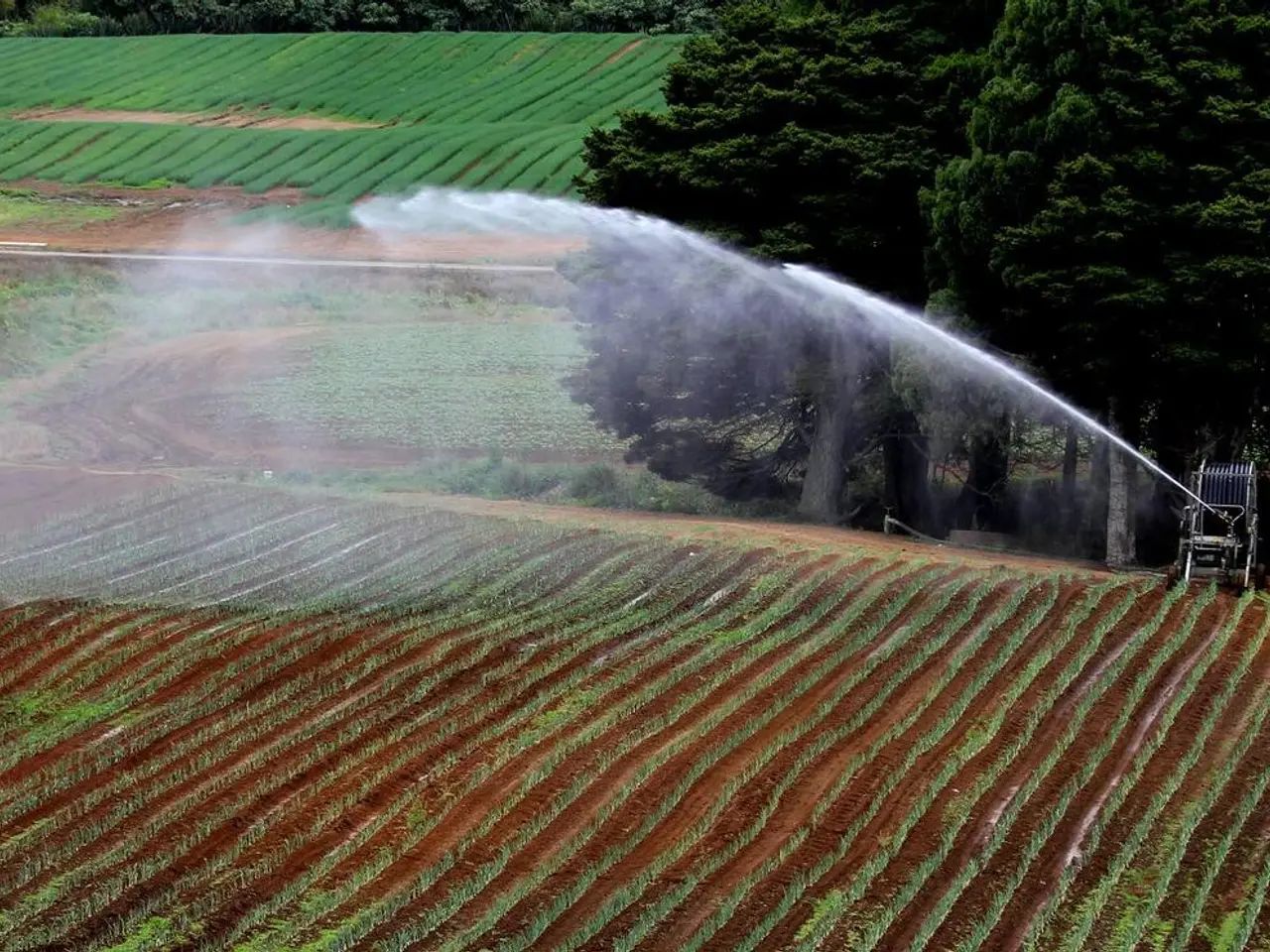Irrigation Strategies deriving from Morocco: Key Insights to Discover
Morocco Leads Africa in Sustainable Irrigation Practices
Morocco is making significant strides in promoting smart irrigation systems, a move that is revolutionizing agricultural productivity across the nation. This transformation is driven by a combination of government policies, financial incentives, and a strong national commitment to improving water efficiency and sustainability in agriculture.
At the heart of Morocco’s smart irrigation policy is the Green Morocco Plan (Plan Maroc Vert), a comprehensive initiative that aims to replace traditional gravity-fed irrigation with efficient drip irrigation systems. These modern systems can reduce water usage by 50–60%, making them a crucial component in Morocco’s journey towards water conservation. The plan targets about 555,000 hectares of irrigated land for modernization and offers targeted financial support to land-titled farmers to access these advanced technologies.
Over the past five years, Morocco’s Agricultural Development Fund (ADF) has committed roughly $1 billion to upgrading irrigation infrastructure nationwide, facilitating widespread adoption of smart irrigation technologies.
Morocco has also introduced programs to help farmers acquire solar-powered irrigation pumps, reducing dependence on fossil fuels and integrating renewable energy with irrigation—a practice known as agrivoltaics.
Complementary to irrigation policies, Morocco has invested heavily in water security infrastructure like the Jorf Lasfar–Khouribga desalinated water pipeline. Though primarily industrial, it supports agricultural water needs and climate resilience by enhancing overall water availability for irrigation.
These policies and financial incentives have positioned Morocco as a leader in sustainable irrigation practices in Africa. Nearly 20% of its arable land is equipped for irrigation, accounting for half of its agricultural GDP. Smart irrigation systems have led to a 34.9% increase in crop productivity (kg/m²) compared to traditional irrigation systems, and a 61.4% reduction in the water/harvest ratio (liters/kg).
The World Bank has played a key role in supporting Morocco's National Irrigation Water Saving Program (PNEEI) and the Green Morocco Plan (PMV). By the end of 2022, the World Bank-backed project had improved water services for over 9,000 farmers, covering 20,700 hectares.
Researcher Ayoub Guemouria emphasizes the significance of Morocco's progress, stating that it presents the current state of irrigation in Morocco and identifies contemporary challenges, while encouraging further irrigation research efforts to ensure the sustainability and resilience of Moroccan agriculture to meet future climate challenges.
Morocco's story serves as a powerful example of what’s possible when governments, farmers, and international partners unite to transform agriculture. Its successes position it as a leading example for other regions facing similar water and agricultural challenges, showcasing how sustainable practices can coexist with economic growth.
African nations can draw valuable lessons from Morocco’s experience, such as developing comprehensive policy frameworks, fostering public-private partnerships, designing support systems for diverse farmer needs, investing in monitoring systems early, addressing infrastructure bottlenecks, and creating accessible financing for small farmers. Morocco's achievements show that other African nations can achieve similar success by creating specialized institutions, fostering global partnerships, and offering targeted financial incentives.
The RESWAG project aims to enhance irrigation services across 51,485 hectares and benefit over 23,000 farmers by 2027. With over 500,000 hectares of land using drip irrigation—about 43% of its irrigated farmland—Morocco boasts one of the highest adoption rates of smart irrigation systems in Africa.
Morocco's journey from struggling with water scarcity in agriculture to becoming a leader in efficient irrigation offers lessons that other African nations can adapt to their unique situations. By addressing climate challenges while ensuring the economic stability of its farmers through the adoption of advanced agricultural technologies, Morocco has demonstrated that a sustainable future for agriculture is possible.
- Morocco's commitment to environmental-science, particularly in regard to sustainable irrigation practices, extends to promoting healthy-cooking methods, as the country recognizes the importance of food-and-drink in health-and-wellness.
- The success of Morocco's sustainable-fitness-and-exercise initiatives has been facilitated by its smart irrigation systems, as these developments have led to a significant increase in crop productivity, thus ensuring the availability of nutritious food.
- As Morocco continues to excel in environmental-science and climate-change mitigation through its irrigation policies, it has also made strides in mental-health awareness, understanding the connection between a healthy lifestyle and overall well-being.
- In line with its sustainable irrigation practices, Morocco has embraced cooking as a means of reducing its carbon footprint, promoting the use of locally-sourced, organic ingredients in favor of processed foods.
- The principles of water conservation and efficiency, exemplified in Morocco's smart irrigation systems, are increasingly being applied to other aspects of life, such as health-and-wellness, fitness-and-exercise, and environmental-science, inspiring a culture of sustainability across the nation.




